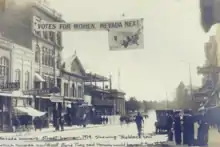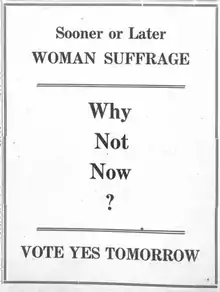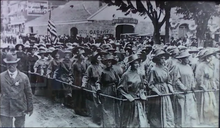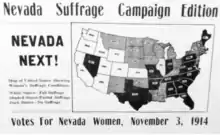Timeline of women's suffrage in Nevada
This is a timeline of women's suffrage in Nevada. In 1869, Curtis J. Hillyer introduced a women's suffrage resolution in the Nevada Legislature which passed, though it would wait for another legislative session to approve a second time. The first women's suffrage convention took place in 1870 in Battle Mountain Station. Several women's suffrage resolutions are voted on, or approved, but none complete the criteria to become amendments to the Constitution of Nevada. In the 1880s, women gain the right to run for school offices and several women run and win. Some Nevada women's suffrage groups work throughout the 1890s and hold more conventions. However, most suffrage work slows down or stops around 1899. The Nevada Equal Franchise Society (NEFS) was created in 1911. That same year, Attorney Felice Cohn writes a women's suffrage resolution that is accepted and passed by the Nevada Legislature. Anne Henrietta Martin becomes president of NEFS in 1912. The next year, Cohn's resolution passes a second time and will go out as a voter referendum the next year. On November 3, 1914 Nevada voters approve women's suffrage. Women in Nevada continue to be involved in suffrage campaigning. On February 7, 1920 Nevada ratifies the Nineteenth Amendment.

19th century

1860s
1869
- Curtis J. Hillyer introduces an equal suffrage bill in the Nevada Legislature.[1] The bill passes to amend the state constitution, but it needs to pass a second vote in two years.[1]
1870s
1870
- July 4: First women's suffrage convention in Nevada is held in Battle Mountain Station.[2]
1871
- The equal suffrage amendment introduced by Hillyer doesn't pass the required second vote.[1]
1873
- Another equal suffrage resolution is unsuccessfully proposed by Assemblyman Oscar Grey.[3]
1880s
1881
- A joint legislative committee in the Nevada Legislature recommends amending the state constitution in favor of women's suffrage, but it fails to gain support.[3]
1883
- Hannah K. Clapp leads the fight to see the Nevada Senate pass a women's suffrage bill, but the bill does not pass the Assembly.[4]
1885
- A women's suffrage resolution passes in the Nevada Legislature and waits to be approved again in two years.[3]
1887
- The women's suffrage resolution fails to pass.[3] However, a resolution for women to run for school offices is passed and waits to be approved again in two years.[3]
1889
- The School office resolution passes and women may run.[3]
1890s
1890
- Several women are elected to school trustee positions and two women, Susan Miller and Josephine Taylor are elected as school superintendents.[3]
1894
- November 30: The Lucy Stone Non-Partisan Equal Suffrage League is formed in Austin, Nevada.[4]
1895
- February: An equal suffrage bill passes the Nevada Legislature and waits to be approved a second time in two years.[5]
- May 17: Susan B. Anthony and Anna Howard Shaw stop in Nevada on their way to California.[5]
- October 29-30: State suffrage convention held in Reno.[4] The State Equal Suffrage Association is formed.[6][5]
1896
- September 24: Second state suffrage convention is held in Reno.[6]
1897
- The equal suffrage bill does not pass a second time.[5]
- October 30: Third state suffrage convention is held in Carson City.[7]
1898
- Women's suffrage petitions are sent throughout Nevada.[3]
1899
20th century

1900s
1907
- Women are declared to be unable to serve as Deputy State Superintendents of Public Instructions by the Attorney General.[3]
- County school superintendents are abolished.[3]
1909
- The Nevada Legislature approved a resolution to allow women to be elected or appointed school superintendents and notaries public.[3]
1910s
1911
- February 4 : The Nevada Equal Franchise Society (NEFS) is organized.[9][3]
- Attorney Felice Cohn writes a bill for women's suffrage that passes the Nevada Legislature.[3]
- The 1909 school superintendent and notary bill is passed a second time, now it will go out as a voter referendum.[3]
- Cohn creates the Non-Militant Suffrage Association.[10]
1912
- Anne Henrietta Martin becomes president of NEFS.[11]
- During the 1912 election, suffragists position themselves at the polls and remind voters to vote for candidates who endorse women's suffrage.[3]
- The voters approve the school superintendent and notary amendment.[3]
- NEFS canvasses to find out which politicians support women's suffrage and then campaign for them.[3]
1913
- The 1911 women's suffrage resolution written by Cohn passes a second time and will go out as a referendum.[3]
- October 30: The Nevada Federation of Women's Clubs (NFWC) officially endorses women's suffrage.[12]
1914
- A Nevada Men's League is created with help from James Lees Laidlaw.[13]
- November: The Nevada Association of Women Opposed to Equal Suffrage (NAWOWS) is formed in Reno.[3]
- November 3: Cohn's suffrage amendment wins with a vote of 10,936 to 7,257.[14]
- The Washoe County Equal Franchise Society dissolves and forms the Woman Citizens' Club.[15]
1915

- February: At the state suffrage convention in Reno, NEFS is dissolved and the Nevada Woman's Civic League is formed.[16]
1916
- April 26: The Suffrage Special stops in Reno.[17]
- April 27: Suffrage Special delegates meet with Governor Emmet D. Boyle in Carson City and attempt to interest women in a new women's party.[18]
- Martin accompanies the Suffrage Special for part of its journey.[19]
- Nevada women are able to vote for the first time in county and state elections.[3]
1918
- August: The Woman Citizens' Club endorses suffragist Sadie D. Hurst for Nevada Assembly.[20]
- November: Hurst wins and becomes the first woman to hold office in the Assembly.[20]
1919
- January: Hurst proposes a resolution to the United States Congress that would show Nevada's support for a federal suffrage amendment.[20] It passes.[20]
- November: A conference is held in Reno with Carrie Chapman Catt speaking.[21] The Nevada League of Women Voters is formed on the last day of the convention.[21]
1920s
1920
- February 7: A special session is called in the Nevada Legislature to speedily ratify the Nineteenth Amendment.[22] Hurst presides over the proceedings and it is passed.[23]
1924
- The Indian Citizenship Act is passed giving Native American women greater voting rights.[24]
See also
References
- "Women in Nevada History". Nevada Suffrage. Retrieved 2020-11-26.
- Ford & Hulse 1995, p. 181.
- Bennett, Dana R.; Reno, Mona. "Nevada Suffrage Timeline". Nevada Suffrage Centennial. Retrieved 2020-11-26.
- Anthony 1902, p. 810.
- Wilkins, Sally. "FRANCES SLAVEN WILLIAMSON". Nevada Women's History Project. Retrieved 2020-11-26.
- Anthony 1902, p. 811.
- Anthony 1902, p. 812.
- Harper 1922, p. 384.
- Harper 1922, p. 384-385.
- "Felice Cohn". ONE. Retrieved 2020-11-27.
- Marcus, Emerson (29 October 2014). "'Epic in politics': Nevada women got vote a century ago". Reno Gazette Journal. Retrieved 2020-11-27.
- Harper 1922, p. 388.
- "Nevada Suffrage Leaders Meet". The Sacramento Union. 24 February 1914. Retrieved 28 November 2020 – via California Digital Newspaper Collection.
- Harper 1922, p. 389.
- Harper 1922, p. 389-390.
- Harper 1922, p. 399.
- "Suffrage Special Welcomed to Reno". Oakland Tribune. 1916-04-27. p. 10. Retrieved 2020-11-27 – via Newspapers.com.
- ""Suffrage Special' Arrives and Members Put in a Busy Day". The Daily Appeal. 1916-04-27. p. 1. Retrieved 2020-11-27 – via Newspapers.com.
- "Miss Anne Martin to Help Women of West". The Washington Herald. 1916-04-05. p. 5. Retrieved 2020-11-27 – via Newspapers.com.
- Harper 1922, p. 390.
- Harper 1922, p. 391.
- Harper 1922, p. 391-392.
- Harper 1922, p. 392.
- "Voting Rights for Native Americans". Library of Congress. Retrieved 2020-11-29.
Sources
- Anthony, Susan B. (1902). Anthony, Susan B.; Harper, Ida Husted (eds.). The History of Woman Suffrage. 4. Indianapolis: The Hollenbeck Press.
- Ford, Jean; Hulse, James W. (Fall 1995). "The First Battle for Woman Suffrage in Nevada: 1869-1871 – Correcting and Expanding the Record" (PDF). Nevada Historical Society Quarterly. 38 (3): 174–188.
- Harper, Ida Husted (1922). The History of Woman Suffrage. New York: J.J. Little & Ives Company.